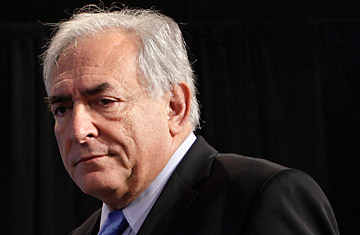
IMF chief Dominique Strauss-Kahn, at a news conference during the IMF–World Bank meetings in Washington on April 16, 2011
Even before Dominique Strauss-Kahn announced from New York's Riker's Island prison on Wednesday that he was stepping down as head of the International Monetary Fund (IMF), world powers were already jostling over who could replace him.
Indeed, since Strauss-Kahn's arrest last Saturday on charges of attempted rape, European officials have been swift to argue that Europe should maintain the hold it has had on the IMF's top job ever since the Washington D.C.-based organization was created in 1945. Europeans, including German Chancellor Angela Merkel, say the IMF's key role in crafting bailout packages for indebted euro zone countries means the job should remain in their hands for the time being.
But emerging economies say this is the moment to break that unwritten rule: in recent days, the Brazilian government has talked about "new criteria" for deciding who heads the IMF, while a Chinese official has called for "fairness, transparency and merit" in the choice.
For now, the IMF can keep ticking over: earlier this week, it named Strauss-Kahn's deputy John Lipsky acting managing director. Yet although Lipsky is a respected official, the 64-year-old American economist is considered a stop-gap, having previously announced he would be stepping down from the organization in August.
So who could step into Strauss-Kahn's shoes? No-one has declared yet — this is not the sort of job for which candidates can openly campaign — but a number of key figures have already emerged as contenders.
One of the early favorites to replace Strauss-Kahn is Turkey's Kemal Dervis. As economy minister, he helped pull Turkey out of its 2001 financial crisis with a tough reform package. A former head of the United Nations Development Program, Dervis, 62, currently heads the global economy program at the Brookings Institution in Washington, D.C. While Turkey ticks the right boxes for emerging economies, it is also a candidate member for the European Union, which could perhaps salve European egos concerned about their waning hold on the IMF job. However, his nationality could also count against him: the single most important issue facing the IMF right now is Greece, and the longtime Aegean rivalry might make this even trickier than it already is.
Another lead contender, French Finance Minister Christine Lagarde, 55, is the highest-profile potential European candidate mentioned. Enormously respected internationally, she has emerged as the doyenne of E.U. finance ministers during the euro-zone crisis. The former head of a top Chicago law firm, she is more at home in Anglo-Saxon cultures than in Parisian salons. If chosen, she would, as a woman, represent a first for the IMF. But her nationality is a drawback: France has had four of the 11 IMF bosses since the institution was set up (including, of course, Strauss-Kahn), and — with Frenchmen leading the European Central Bank and the World Trade Organization — her country is somewhat overrepresented in global economic institutions.
Montek Singh Ahluwalia, influential economic adviser to Indian Prime Minister Manmohan Singh, is close behind. As the former head of the IMF's independent-evaluation office, the deputy Chairman of India's Planning Commission helped set the stage for India's current 8% growth. But at 67, Ahluwalia's age may count against him. And although his technocratic experience is impressive, his résumé does not include any major ministerial postings.
Going to head-to-head with Lagarde as the most likely European on the list is Axel Weber, former head of the Bundesbank, Germany's national bank. Weber, 54, thought to be Chancellor Merkel's preferred choice, is an inflation-fighting monetary "hawk". He was considered the leading candidate to head the European Central Bank until his surprise resignation as Bundesbank President in February. However, he has a reputation as something of a loose cannon — and given Germany's tough stance on bailouts for Greece, the IMF's current role in the country makes Weber an awkward choice.
Singapore's Finance Minister Tharman Shanmugaratnam, 53, came into politics on the back of long stints in his country's monetary authority, central bank and financial regulator. In March, he was named head of the IMF's key International Monetary and Financial Committee. But on Wednesday, as he was named Deputy Prime Minister in the new Singaporean government, he dismissed talk of heading the IMF.
One heavyweight who is very keen on the job is former British Labor Prime Minister Gordon Brown, 50. Having overseen national economic and financial matters as the U.K.'s longest serving Chancellor of the Exchequer, he can boast gushing references from respected Nobel Prize-winning economists Paul Krugman, Joseph Stiglitz and Amartya Sen. However, in April his Conservative successor David Cameron indicated he would block any such move, saying Brown was someone "who didn't think we had a debt problem in the U.K. when we self-evidently do." And given the allegations about Strauss-Kahn, Brown's notorious temper would also be an issue for the IMF.
Numerous other names have also been mentioned, including Mexico's Central Bank Governor Agustín Carstens; Bank of Israel Governor and former Chief Economist at the World Bank, Stanley Fischer; South African Finance Minister Trevor Manuel; Brazilian Central Bank President Arminio Fraga; and Mohamed El-Erian, the Egyptian head of the PIMCO bond fund. With the IMF deeply embroiled in the ongoing euro-zone crisis, this is a critical moment for the global lending agency, and Strauss-Kahn is departing in the most controversial way. Yet the long list of names being raised shows there is no shortage of candidates to take on the challenge he leaves behind.
